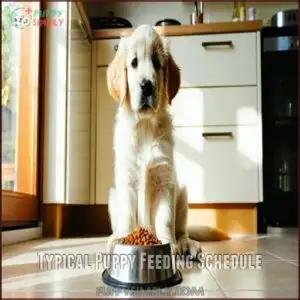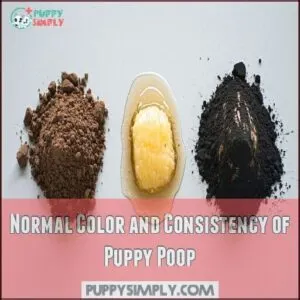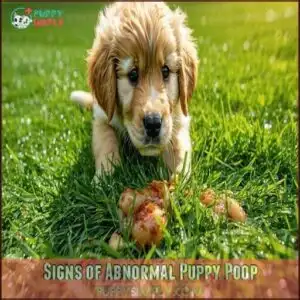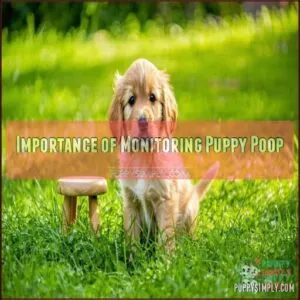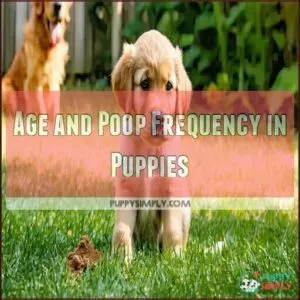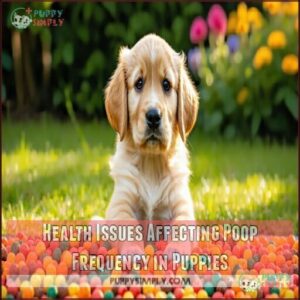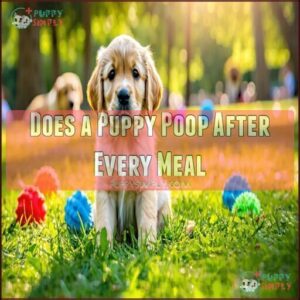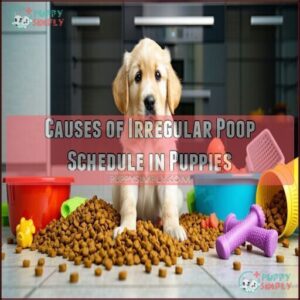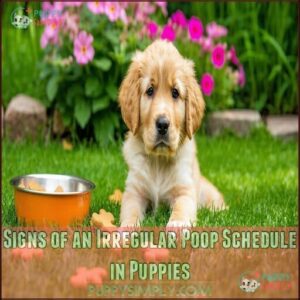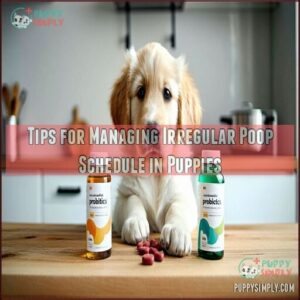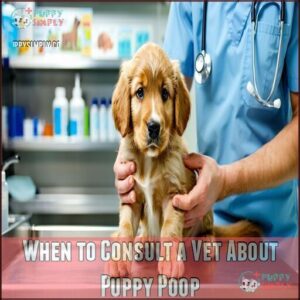This site is supported by our readers. We may earn a commission, at no cost to you, if you purchase through links.
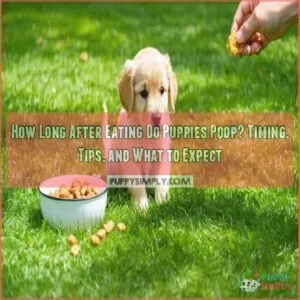 Puppies usually poop 15-30 minutes after eating, thanks to their speedy digestive systems. Their little tummies work quickly, so you’ll often notice them needing to relieve themselves shortly after a meal.
Puppies usually poop 15-30 minutes after eating, thanks to their speedy digestive systems. Their little tummies work quickly, so you’ll often notice them needing to relieve themselves shortly after a meal.
Timing can vary depending on factors like age, size, and diet, but keeping a consistent feeding schedule helps regulate their potty routine. Watch for cues like sniffing or circling—it’s their way of saying it’s time!
Remember, each pup is unique, so patterns might take some time to figure out. Curious about how to encourage healthy habits or handle irregular schedules? Understanding your puppy’s signals leads to smoother days ahead.
Table Of Contents
- Key Takeaways
- Typical Puppy Feeding Schedule
- How Long After Eating Do Puppies Poop
- Signs of Healthy Puppy Poop
- Does a Puppy Poop After Every Meal
- Dealing With Irregular Poop Schedule
- When to Consult a Vet About Puppy Poop
- Tips for Encouraging Puppies to Poop After Eating
- Frequently Asked Questions (FAQs)
- How long do puppies poop after eating?
- How to stop a puppy from eating poop?
- Do dogs poop after every meal?
- How long should a puppy go after eating?
- How long will it take for a puppy to poop after eating?
- Is it normal for a puppy not to poop after eating?
- Is it normal for a puppy to go 12 hours without pooping?
- How long after a meal does a puppy poop?
- How to get a puppy to poop after eating?
- Is it normal for my puppy not to poop after eating?
- Conclusion
Key Takeaways
- Puppies usually poop 15–30 minutes after eating because of their fast digestion and active gastrocolic reflex.
- Age, diet, and routine impact how fast puppies poop, so watch for signs like sniffing or circling after meals.
- Regular feeding schedules help regulate your puppy’s bowel movements and make potty training easier.
- If your puppy doesn’t poop after eating, it’s normal, but monitor their behavior for constipation or unusual changes.
Typical Puppy Feeding Schedule
Feeding your puppy on a regular schedule is key to their health and helps regulate bathroom habits.
Regular feeding keeps your puppy healthy, happy, and on track with predictable potty habits.
By sticking to consistent meal times, you’ll create a routine that makes life easier for both you and your puppy.
How Often to Feed Puppies
Feeding frequency for puppies depends on their age, portion control, and digestion needs.
A good puppy feeding schedule typically includes three to four meals daily.
Keep it consistent to support their healthy growth and smooth bowel movements.
Here’s how to set a routine:
- Feed younger puppies 4 times daily.
- Switch to 3 meals as they grow.
- Monitor weight and adjust portions.
Newborns, however, require careful attention to their feeding frequency by age, which is crucial for their healthy growth and smooth bowel movements, and a good understanding of portion control.
Factors Affecting Feeding Frequency
Your puppy’s feeding schedule depends on factors like age considerations, breed differences, activity levels, and food quality.
Younger pups and active breeds need frequent meals to support their fast-growing digestive system.
High-quality food promotes digestion, while health conditions may require adjustments.
Keep an eye on your pup’s cues and energy to tweak their routine for ideal puppy poop frequency.
Sample Feeding Schedule for Puppies
A solid puppy feeding schedule keeps their digestion smooth and predictable.
Try this plan:
- 7 AM: Breakfast sets the day’s tone.
- 12 PM: A hearty lunch fuels playtime.
- 4 PM: An afternoon snack keeps energy steady.
- 7 PM: Dinner supports puppy digestion.
- 10 PM: Light kibble aids restful sleep.
Consistency supports portion control, hydration needs, and a steady puppy potty schedule!
How Long After Eating Do Puppies Poop
After eating, most puppies need to poop within 5 to 30 minutes because their digestion works quickly.
The exact timing depends on their age, diet, and routine, so understanding these factors can help you plan more effectively.
Their digestion works quickly, which is why planning is crucial.
Factors Affecting Poop Frequency in Puppies
In the case of puppy bowel movements, several factors shape their frequency.
Younger puppies, like 8-week-olds, have faster puppy digestion, so they poop more often. Smaller breeds, with tinier stomachs, produce frequent stools too.
A high-protein diet or foods with dietary fiber can speed up their puppy poop time. Stress factors, such as adjusting to a new home, also impact the puppy potty schedule.
Hydration levels and regular exercise impact gut health substantially, promoting healthy digestion. Watch for changes in behavior, as parasites or health issues can disrupt their routine and upset the puppy digestive system.
Average Time for Puppies to Poop After Eating
Most puppies poop 20–30 minutes after eating, thanks to their active gastrocolic reflex.
Puppies often poop within 20–30 minutes after eating due to their active gastrocolic reflex, keeping things moving quickly!
However, puppy poop time can vary.
Younger pups often go faster, while older ones take longer as their digestive system develops.
Meal composition, activity levels, and breed differences also play a role.
Watch for signs of a bowel movement and head outside quickly to encourage regular habits and understand the importance of digestive system development.
Variations in Poop Frequency Among Puppies
No two pups share identical poop habits.
Age, breed differences, and size matter in the context of their bowel movements.
Activity levels and individual metabolism also play key roles in puppy digestion.
A sensitive gut microbiome can make timing unpredictable.
Watch for puppy digestive issues like stress or illness, as a stable puppy routine keeps poop regular and prevents surprises.
No two pups share identical poop habits.
Age, breed differences, and size matter in the context of their bowel movements.
Activity levels and individual metabolism also play key roles in puppy digestion.
A sensitive gut microbiome can make timing unpredictable.
Watch for puppy digestive issues like stress or illness, as a stable puppy routine keeps poop regular and prevents surprises.
Puppies, due to their faster digestion, may have increased poop frequency, compared to adult dogs, which can be influenced by stable puppy routine, sensitive gut microbiome, puppy digestive issues, breed differences, and individual metabolism.
Signs of Healthy Puppy Poop
Healthy puppy poop gives you a clear picture of your pup’s digestion and overall health. Pay attention to its color, shape, and texture to confirm everything’s running smoothly.
Normal Color and Consistency of Puppy Poop
A healthy puppy’s stool is usually soft but firm, with a chocolate-brown shade.
Variations in size or shade are normal, reflecting diet and digestion. Watch for consistency factors—like being too mushy or overly dry—to guarantee balance.
Here’s a quick reference table:
| Aspect | Normal | Potential Issues |
|---|---|---|
| Color | Brown Variations | Yellow, black, or red |
| Consistency | Soft, firm | Hard, watery |
| Odor | Mild | Overly strong or foul |
Proper observations guarantee your pup’s digestive health.
Signs of Abnormal Puppy Poop
A healthy puppy poop is firm and easy to pick up, but watch out for consistency changes like diarrhea or dry, pellet-like stools.
Pay attention to poop color, abnormal odors, and signs of parasites. Beware of blood or mucus—it’s never normal.
Here’s a quick checklist:
- Watery diarrhea
- Bloody streaks
- Mucus lining
- Foul-smelling stools
- Pale or black color
Importance of Monitoring Puppy Poop
Tracking your puppy’s poop mightn’t top your fun list, but it’s a window into their health.
Keep an eye out for these:
- Stool Consistency and Color Variations: Healthy poop is brown and firm, not too dry or mushy.
- Frequency Matches Eating Habits: Irregular patterns may signal dietary or digestive issues.
- Hydration Levels and Dietary Impact: Hard stools suggest dehydration; loose ones may point to food sensitivity.
Age and Poop Frequency in Puppies
Poop frequency in puppies depends a lot on their age and growth stage.
Younger pups have immature digestion, so expect plenty of puppy bowel movements daily—3 to 5 times at 2 months.
As they mature, holding stool time and frequency improve.
Breed size also matters—smaller breeds often poop more.
Puppy digestion shifts fast, so potty habits evolve quickly, which is why potty habits are important to monitor.
Diet and Poop Frequency in Puppies
A puppy’s diet plays a huge role in their bowel movements.
Consider these key factors:
- Food Quality: High-quality puppy food leads to healthier digestion and regular poop habits.
- Fiber Intake: Proper fiber balances stool consistency.
- Hydration Impact: Fresh water guarantees smooth digestion.
- Digestibility Factors: Easily digestible meals minimize waste, creating better poop schedules.
Adjust diets gradually to avoid tummy trouble.
Health Issues Affecting Poop Frequency in Puppies
You’ve got to keep an eye on your puppy’s poop schedule—health issues can stir up trouble.
Parasites, dehydration, or food allergies might affect digestion, leading to diarrhea, constipation, or odd-colored stools. Stress or foreign objects can also throw things off. Look for sudden changes and take action.
- Parasites: Common in puppies; cause diarrhea or bloating.
- Dehydration: Leads to hard, dry stools.
- Allergies: Trigger irregular digestion.
- Coprophagia: Eating poop can signal nutritional deficiencies.
Does a Puppy Poop After Every Meal
You might wonder if your puppy needs to poop after every meal, but the answer depends on several factors like age, diet, and routine.
While most puppies poop shortly after eating, it’s not guaranteed every single time.
Factors Affecting Poop Frequency After Meals
Poop timing varies due to a mix of diet composition, hydration levels, playtime, and stress.
The gastrocolic reflex means their digestive system kicks into gear right after eating.
Feeding high-quality food and keeping them active supports comfortable puppy digestion. For extra support, consider digestive aid options.
Watch your puppy’s poop habits closely. Healthy puppy bowel movements often follow meals, reflecting their unique rhythm and routine.
Why Puppies May Not Poop After Every Meal
Sometimes puppy bowel movements skip a beat after meals due to factors like stress impact (new surroundings or routine disruptions), medical reasons (parasites or illness), or even changes in food quality and hydration levels.
Each pup has unique digestion time and habits.
Considering gut health supplements may aid digestion.
Remember, puppy potty habits aren’t one-size-fits-all, so focus on their eating and digestion patterns to understand their schedule better.
Tips for Encouraging Puppies to Poop After Meals
Encouraging puppy elimination after meals takes a mix of strategies and patience. Stick to a consistent schedule for feeding and bathroom breaks.
Take them to a familiar, friendly environment daily for potty time. Use positive reinforcement with treats or praise when they poop.
Consider adding light exercise or play before heading out, as it supports puppy digestion. Make certain proper hydration strategies to maintain regularity.
Many owners find success with motivational puppy snacks.
- Feed on a set schedule.
- Establish a bias for one potty spot.
- Use rewards to reinforce success.
- Allow movement to stimulate digestion.
Dealing With Irregular Poop Schedule
When your puppy’s poop schedule feels unpredictable, it can leave you guessing and concerned.
Understanding the causes and knowing how to manage irregularity will help keep your pup healthy and on track.
Causes of Irregular Poop Schedule in Puppies
An irregular poop schedule in puppies often stems from dietary changes, stress factors, or dehydration disrupting puppy digestion.
Inconsistent hydration levels harden stools, while poor puppy eating habits or overeating can confuse puppy poop habits.
Medical conditions like parasites or infections impact puppy bowel movements, causing loose or infrequent stools.
Lack of exercise affects puppy diet digestion, slowing down bathroom trips.
Routine consistency helps regulate their system.
Consistent and regular bowel movements indicate good puppy gut health.
Signs of an Irregular Poop Schedule in Puppies
Watch for signs like straining, mucus, blood, infrequent pooping, or excessive pooping—they indicate irregular puppy poop habits.
Changes in stool consistency, like soft or hard stools, can signal puppy digestion issues. Monitor puppy eating habits and activity levels closely; unusual lethargy or picky eating might reflect trouble with puppy bowel movements.
Regular observation guarantees healthy puppy poop patterns and digestion maintenance.
Tips for Managing Irregular Poop Schedule in Puppies
Consistency is key to managing an irregular poop schedule.
Stick to set meal times and monitor puppy digestion to predict puppy poop timing.
Dietary adjustments, like switching to high-quality food, can improve digestion and reduce irregularity.
Make certain hydration strategies are in place—fresh water aids puppy bowel movements.
Exercise impacts digestion too, so add playtime.
Consider probiotic supplements for a healthy gut and reduce stress by maintaining calm puppy potty training routines.
When to Consult a Vet About Puppy Poop
If your puppy’s poop looks unusual or they’re struggling to go, it’s time to call the vet.
Early action helps catch potential issues and keeps your pup healthy.
Importance of Regular Veterinary Check-Ups
Don’t underestimate regular puppy vet visits—they’re your ace in the hole for ensuring puppy health. These check-ups catch surprises like parasites early, keeping puppy poop—and digestion—on track. Think of them as preventative care for long-term health.
- **Preventative care detects hidden risks.
- **Early detection stops problems before they grow.
- **Parasite control keeps bowels healthy.
- **Vaccination schedules protect from illness.
- **Nutritional guidance supports healthy digestion.
How to Prepare for a Veterinary Consultation
Before heading to the vet, gather your puppy’s medical history and jot down symptoms or changes you’ve noticed, like odd puppy poop.
Bring stool samples for testing, along with details on medications or diet. List questions about digestion or health.
Pack treats or toys to keep them calm during the visit. Puppy vet visits can be stress-free with a little planning!
Tips for Encouraging Puppies to Poop After Eating
Getting your puppy to poop after meals is all about timing, consistency, and setting the right environment.
By establishing simple routines and gently encouraging them, you can make potty time a smooth process.
Establishing a Consistent Feeding Schedule
Keeping your puppy on a regular feeding schedule keeps their digestion on track.
Here’s how:
- Stick to consistent meal times daily—puppies thrive on routine.
- Adjust portion sizes and frequency as they grow to match their needs.
- Choose high-quality food and confirm hydration importance to support digestion and overall health.
Monitor their stool to confirm proper milk intake for healthy digestion. Feeding consistency simplifies puppy digestion and potty training!
Creating a Poop-Friendly Environment
Creating a poop-friendly environment makes puppy housetraining easier for everyone.
Start by picking a spot where your puppy feels safe. A quiet crate location helps establish a stress-free environment, while an indoor doggie lawn or litter box is great for rainy days.
Stick to a consistent routine for bathroom breaks because predictability builds good puppy bathroom habits.
Here’s a quick guide to get started:
| Tip | Why It Works |
|---|---|
| Design specific spots | Familiarity reduces accidents |
| Hydration levels matter | Keeps digestion and stools regular |
| Exercise regularly | Encourages faster bowel movements |
By tailoring the space to your puppy’s needs, you’re setting them up for reliable success and smoother puppy training!
Rewarding Puppies for Pooping After Meals
Turning potty time into a rewarding experience makes puppy training smoother. Positive reinforcement works wonders!
- Reward immediately with treats—timing is key.
- Use clicker training for clear communication.
- Be consistent with rewards to reinforce habits.
- Add verbal praise like “Good job!” while smiling—puppies thrive on affection.
With love and puppy rewards, every success becomes a celebration!
Frequently Asked Questions (FAQs)
How long do puppies poop after eating?
Imagine this: your puppy finishes their meal, and within 5 to 30 minutes, nature calls.
Younger puppies often go sooner due to their small stomachs and quicker digestion.
Always be ready for potty time!
How to stop a puppy from eating poop?
Stop your puppy from eating poop by cleaning up right after they go, offering tasty rewards for good behavior.
Adding deterrents like pineapple to their diet can also help.
Vet checks rule out medical causes for this habit.
Do dogs poop after every meal?
Dogs don’t always poop after every meal, though it’s common.
Puppies might poop soon after eating thanks to their gastrocolic reflex, but adults often pass stool once or twice daily based on routine and diet.
How long should a puppy go after eating?
A puppy usually needs to poop 5 to 30 minutes after eating, thanks to their quick digestion and gastrocolic reflex.
Timing can vary, so watch for signs like circling or sniffing to guide them outside.
How long will it take for a puppy to poop after eating?
After eating, puppies often poop quickly, like clockwork ticking.
Usually, it takes 5 to 30 minutes, thanks to their gastrocolic reflex.
Younger puppies need breaks sooner—so stay ready for their post-meal bathroom routine!
Is it normal for a puppy not to poop after eating?
It’s normal if your puppy doesn’t poop after eating right away.
Timing depends on age, diet, and routine. If they seem comfortable and healthy otherwise, give them time.
Monitor their behavior and adjust schedules.
Is it normal for a puppy to go 12 hours without pooping?
Like waiting for a kettle to boil, 12 hours without pooping can be concerning.
For puppies, long gaps might signal constipation, stress, or a medical issue.
Keep an eye on them, and consult your vet.
How long after a meal does a puppy poop?
After meals, most puppies poop within 5 to 30 minutes, thanks to their gastrocolic reflex.
Younger puppies may need to go sooner.
It’s important to take them outside quickly to establish good habits.
How to get a puppy to poop after eating?
Think of your puppy’s digestive system as a clock—predictable and routine.
After eating, take them outside within 5–30 minutes.
Use a designated potty spot, stay consistent, and give praise to reinforce the habit.
Is it normal for my puppy not to poop after eating?
It’s common if your puppy doesn’t poop right after eating.
Timing varies—puppies might take 5–30 minutes or longer.
If they consistently skip pooping, watch for signs of constipation or digestive issues.
Conclusion
Understanding how long after eating puppies poop helps you create a smooth potty routine.
Most puppies poop 15-30 minutes after meals, though timing depends on their age, size, and diet.
Watching for signs like sniffing or circling can guide you to act quickly.
Stick to a consistent feeding schedule, and don’t stress if your puppy doesn’t always poop right away—every pup’s different.
With patience and attention to their habits, you’re setting your puppy up for success.
- https://porchpotty.com/blogs/news/how-often-will-puppies-poop?srsltid=AfmBOor3-21ZaxcZHfXO7_9qEElHa6YFhPAJRnBXj3a7XdH0tA2AYSvP
- https://www.quora.com/Is-it-normal-for-a-puppy-to-poop-every-8-10-hours
- https://www.akc.org/expert-advice/training/potty-training-your-puppy-timeline-and-tips/
- https://www.petmd.com/dog/general-health/how-often-should-dogs-poop
- https://modernvet.com/how-long-after-eating-does-dog-poop/

